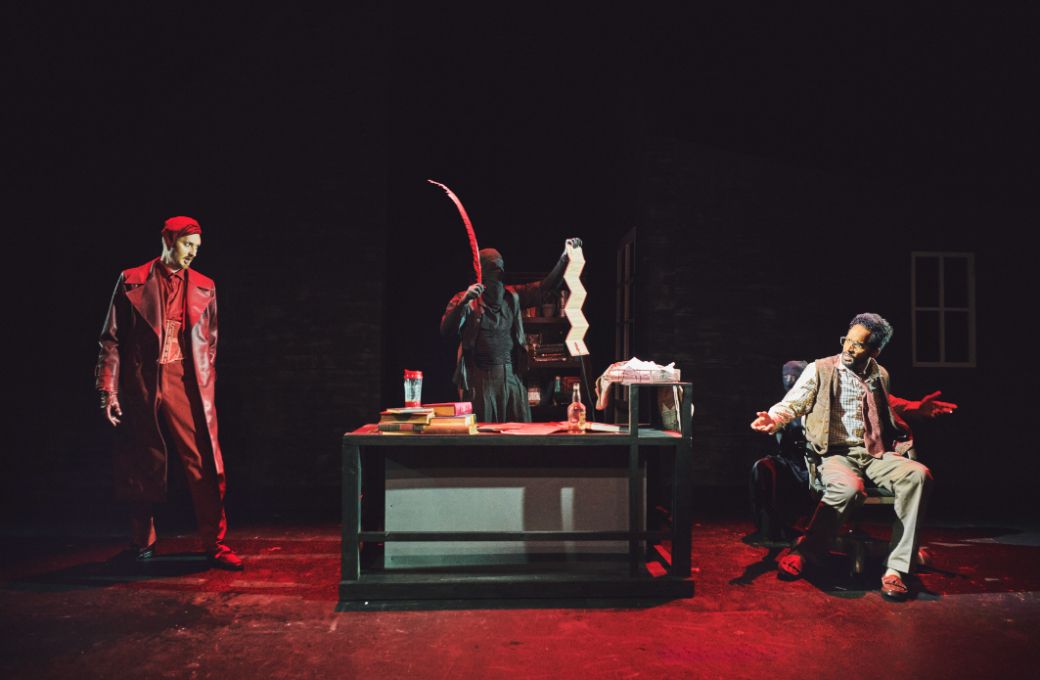New York City’s small and dedicated Heartbeat Opera closes its 11th season with a staging of Faust and a bit of (likely) unintentional historical parallel. The production, at Baruch Performing Arts Center in Manhattan, comes on the heels of their modern-day take on Salome in March, a couple of months before the Metropolitan Opera opened its own new production. And Faust, as it happens, was the Met’s inaugural production in 1883. These are, of course, coincidences. In real life, Davey and Goliath rarely take notice of one another, but it makes for a good excuse to appreciate what Heartbeat has to offer. With economical staging and inventive productions, the company has built a reputation for being affordable and approachable while avoiding attitude.

One of Heartbeat’s primary assets is music director Dan Schlosberg, who cleverly arranged their Salome for a small choir of clarinets. With Schlosberg on hiatus, composer Francisco Ladrón de Guevara was enlisted for Faust. His scoring of Gounod’s 19th-century tale of dealings with the devil wasn’t as radical a reworking as Schlosberg’s work generally is, but it is compact and lively, with cabaret touches brought to some of the comic songs.
As devil’s apprentice Méphistophélès, John Taylor Ward readily fulfilled that promise in the score. Evil always has a way of stealing scenes, but Ward was savvy, alluring and confident, bringing a non-binary, Weimar flair to the role. Orson Van Gay II as Faust drew easy sympathies with his warm tenor and Rachel Kobernick as Marguerite, the object of Faust’s desire, was charming and fresh. But the unexpected anchor was AddieRose Brown as the young Siébel. Recasting the young man who pines for Marguerite as female wasn’t just a woke nod. The gender switch was seamless and barely noticeable in Heartbeat’s contemporary setting. But more than that, the on-point mezzo brought Siébel to life with a millennial sensibility, giving the most sympathetic and simply human performance in the piece.
Two figures in black (Rowan Magee and Emma Wiseman), like faceless ninjas, provide the magic and add to the fun, giving the demon extra arms, floating a contract across the room, serving as a mirror image, even putting on a Punch and pregnant Judy show. But all was not novelty and frivolity. Gounod’s polyphony in particular was rendered beautifully, and the staging, while simple, was convincing and graceful.
Sara Holdren, in her New York directorial debut, adapted the story with Heartbeat Artistic Director Jacob Ashworth. Holdren is a theatre critic and Shakespeare scholar who studied with the Bread and Puppet company, long behind very political efforts both large and small. Their adaptation retains the spoken dialogue of the original version of the opera, but puts it into contemporary (sometimes very contemporary) English, while retaining French for the sung portions. At two hours without interval, it did feel a bit long – although considerably less than the usual three-hour run time – and ramped up to a fairly perplexing finale.
Invention and expense aren’t incompatible, of course, but if one had to choose between the two, passion-driven projects are likely to be more enticing than those built on cash-infusion. Faust made a bad deal with the devil, but Heartbeat more than holds up their end of the bargain.


